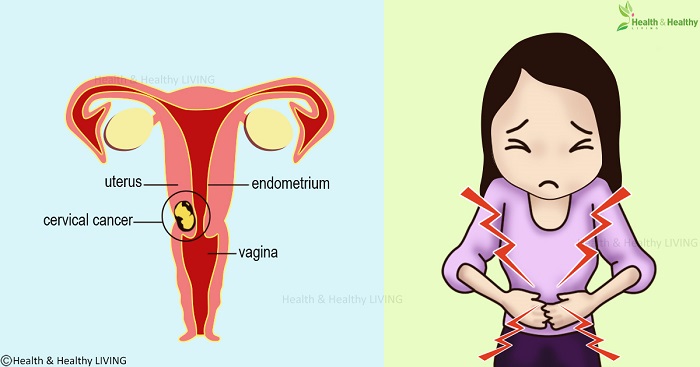Maybe it sounds a bit scary, but in most cases, women with early cervical cancer and pre-cancer don’t experience any symptoms, until the cancer grows and becomes more serious.
Symptoms occur when the cancer grows into a nearby tissue.
It is extremely important to make Pap screenings regularly, so you will be able to detect and treat cervical cancer, and other reproductive cancer like ovarian cancer, before they spread and worsen your condition.
The Pap test can locate abnormal cells in the cervix which are then monitored and treated if necessary.
However, there are other early signs of cervical cancer. So, keep reading, and find out more!
1. Irregular Bleeding
Irregular vaginal bleeding is the most common symptom of cervical cancer. It can occur in between menstrual periods or after sex. It might be disguised as spotting, showing as a slight blood-streaked discharge.
Menstrual bleeding can also last longer than usual and become heavier. If vaginal bleeding occurs in post-menopausal women who no longer have periods, this can be a sign of cervical cancer or other problems.
2. Unusual Vaginal Discharge
There are a few types of vaginal discharge that can be considered as an early sign of cervical cancer. A continuous discharge of these characteristics can be a sign:
- Watery
- Brown
- Tinged with blood
- Foul-smelling
- Pale
3. Pelvic Pain
Another warning sign for cervical cancer is pain during intercourse or at other times. It could indicate abnormal changes to the cervix. Cervical cancer can spread within the pelvis.
Signs of Advanced Stages of Cervical Cancer
If you experience any of these symptoms, that could indicate advanced cervical cancer:
- Fatigue
- Weight loss
- Back or pelvic pain
- Swelling in one or both of the legs
- Difficulty going to the bathroom due to obstruction
What Puts You at Risk?
So, if you notice any of the early warning signs, you should act immediately before cervical cancer spreads and become more dangerous. These are the factors that can increase your risk of developing cervical cancer:
- Having sex for the first time at a young age
- Having sex with a man whose partner had cervical cancer
- Having many sexual partners
- Smoking
- Mother’s use of diethylstilbestrol (DES) during pregnancy
- A compromised immune system
According to the American Cancer Society, all of the previously mentioned signs and symptoms can be caused by conditions other than cervical cancer, like an infection that can cause pain or bleeding.
So, if you notice any of these symptoms, you should visit your doctor immediately. Even if it an infection, you will still need to treat it. Getting regular Pap tests will help to detect cancerous cells in time, before they have a chance to spread and worsen the condition:
Watch the video below to find out more about the early signs of cervical cancer:
Sources: www.davidwolfe.com
